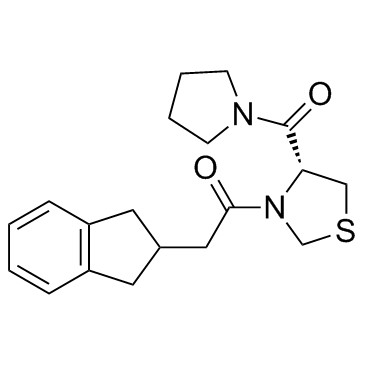| Description |
Z-321 is a prolylendopeptidase (PEP) inhibitor.
|
| Related Catalog |
|
| Target |
PEP[1]
|
| In Vivo |
Z-321 is a prolylendopeptidase (PEP) inhibitor. In the 100 or 200 mg/kg Z-321-treated groups, mean lordosis quotient (LQ) decreases after administration. However, there is no statistical difference among the values before and after. In contrast, the mean LQ in the 300 mg/kg Z-321-treated females is lower than that before injection (P<0.005). Furthermore, when compare to that in the vehicle-treated control group, mean LQ is also significantly lower (p<0.05). The incidence of soliciting behavior decreases after treatment with 300 mg/kg Z-321, when compare to that before treatment, but there is no statistical difference. The present study also demonstrates that 300 mg/kg Z-321 is effective in inhibiting lordosis behavior without disturbance of locomotor activity[1].
|
| Animal Admin |
Femal wistar rats (200 to 250 g) are used and housed under conditions of controlled temperature (23 to 26°C) and photoperiod (14: 10 h, light:dark). Fifty four rats are ovariectomized under ether anesthesia. Two weeks after ovariectomy, sexual behavioral tests are carried out before and after a treatment with Z-321 (100, 200 or 300 mg/kg). Another group of rats, 7 females are given 1 mL/kg of 10% gum arabic as control group[1].
|
| References |
[1]. Oosuka I, et al. Decrease of sexual receptivity by prolylendopeptidase inhibitor in female rats. Jpn J Pharmacol. 2000 May;83(1):82-5.
|
